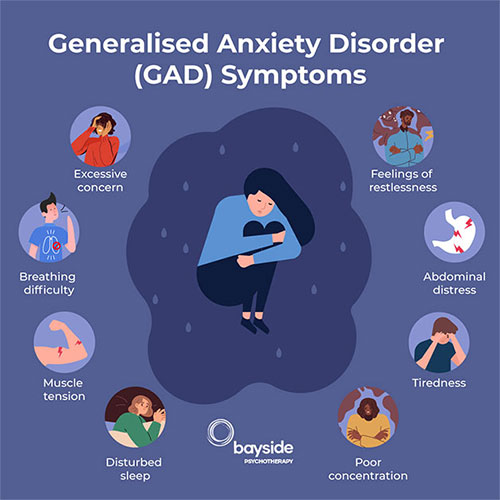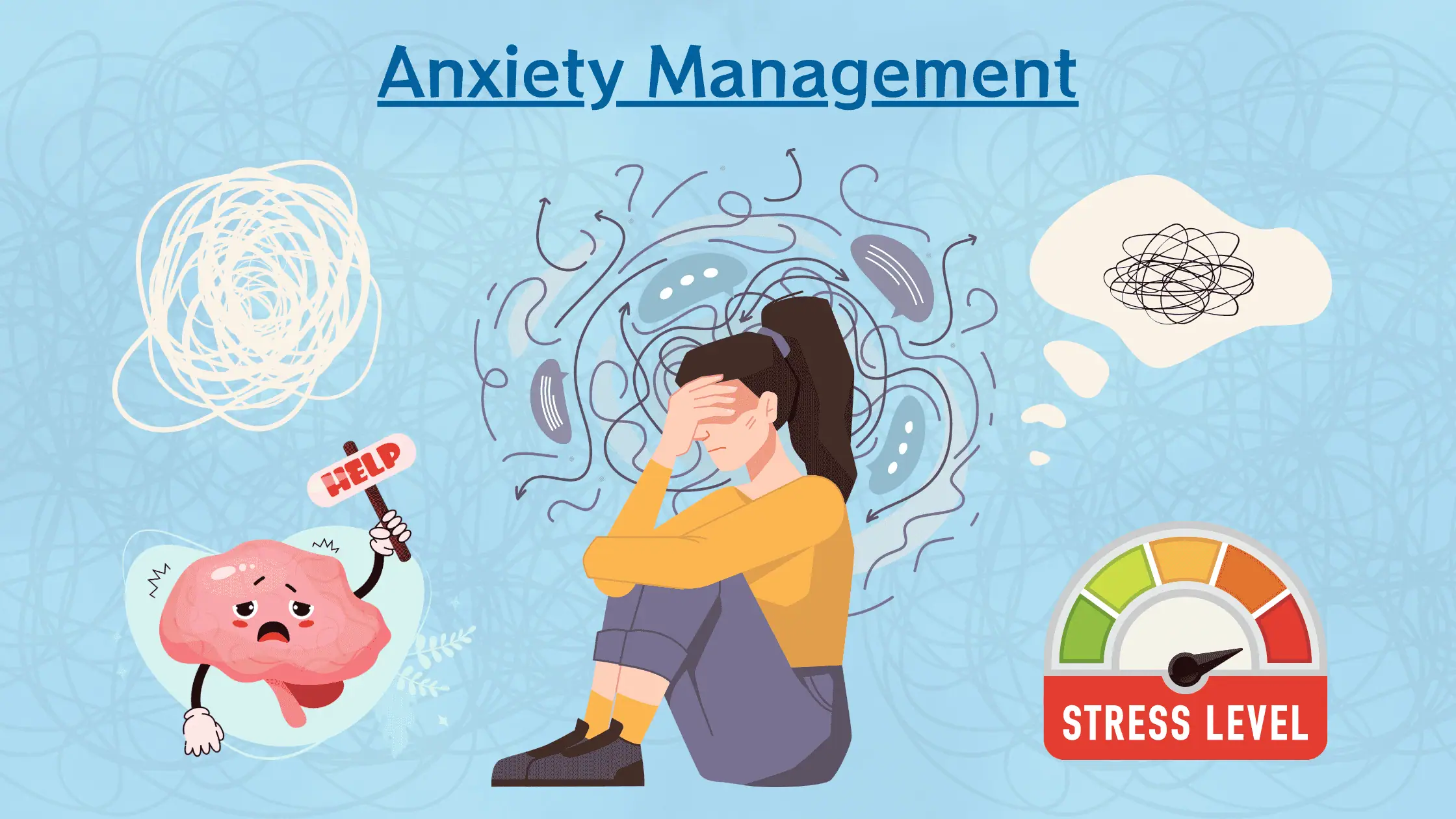How a licensed therapist for anxiety can help you manage daily stress
How a licensed therapist for anxiety can help you manage daily stress
Blog Article
Exploring Various Approaches in Therapy for Anxiousness Condition for Long-term Change
When dealing with stress and anxiety problems, it's vital to explore a variety of therapy approaches. Each technique supplies unique insights and devices to aid you handle your symptoms successfully. You may find that integrating strategies can generate the finest outcomes. Nonetheless, understanding the subtleties of these methods is vital to cultivating long-term modification. What happens if the best mix could launch a brand-new degree of emotional health for you?
Comprehending Anxiousness Conditions: A Quick Summary
Stress and anxiety disorders, which affect countless individuals worldwide, can greatly impact every day life. You may experience frustrating feelings of worry or stress that appear unmanageable. These feelings can cause physical signs and symptoms like a racing heart, sweating, and even dizziness. Usual kinds of anxiousness disorders consist of generalized anxiety problem, panic problem, and social stress and anxiety problem. Each has special indicators, but they all share a tendency to disrupt your regular and relationships.Understanding the origin triggers of your anxiety is essential. It may originate from genes, brain chemistry, or life experiences. Acknowledging your triggers can help you handle your reactions much better. It is essential to keep in mind that you're not alone in this battle. Lots of people encounter similar obstacles, and looking for aid is a strong action toward feeling much better. By finding out about stress and anxiety disorders, you're currently on the path to understanding and managing your condition much more properly.
Cognitive-Behavioral Therapy: Testing Negative Thought Patterns
In Cognitive-Behavioral Therapy, you'll begin by identifying the adverse idea activates that add to your anxiousness. You'll work on changing them with even more favorable choices once you recognize these thoughts. With each other, you'll construct efficient coping methods to assist handle your anxiousness in everyday circumstances.
Determining Adverse Idea Triggers

When you experience moments of distress, acknowledging the certain triggers behind your unfavorable ideas can be vital in taking care of anxiousness. Beginning by taking note of scenarios that prompt sensations of fear or fear. Is it a congested space, an approaching target date, or a discussion with particular people? Write down these circumstances in a journal. This will help you determine patterns in your thinking. Likewise, notice physical sensations that accompany your negative ideas, like a racing heart or tightness in your upper body. By pinpointing these triggers, you gain understanding right into what's sustaining your anxiousness. Recognizing these links is the very first step in testing those thoughts and ultimately restoring control over your emotional reactions.
Changing Thoughts With Positives
Challenging adverse idea patterns is a vital action in changing your mindset and lowering stress and anxiety. You may often locate yourself entraped in cycles of self-doubt or tragic thinking. Rather than letting these ideas dictate your sensations, practice changing them with positive affirmations or realistic alternatives. As an example, when you think, "I can not manage this," move it to, "I can handle difficulties one step each time." This simple change can substantially influence your emotion. Consistently recognizing and countering these negative thoughts helps create a healthier internal dialogue. Keep in mind, it takes some time and effort, however continually exercising this strategy can bring about long-term change, empowering you to face anxiety with renewed confidence and strength.
Structure Coping Approaches With Each Other
Changing adverse ideas is only the beginning of handling stress and anxiety properly. To develop lasting modification, you require to develop coping strategies that empower you. Cognitive-Behavioral Treatment (CBT) aids you determine and challenge those unhelpful thought patterns. Together, you and your counselor can explore exactly how these ideas impact your feelings and behaviors.Start by developing useful methods, like journaling or mindfulness exercises, that permit you to challenge stress and anxiety head-on. When you face your fears gradually, you'll learn to react differently.

Mindfulness and Acceptance-Based Approaches: Growing Present-Moment Understanding
As you navigate the intricacies of anxiety, incorporating mindfulness and acceptance-based approaches can substantially enhance your capacity to grow present-moment understanding. By focusing on the present moment, you'll find that you can observe your thoughts and feelings without judgment (Counseling services for anxiety). This method assists you recognize your anxiety without really feeling overwhelmed by it.Engaging in mindfulness workouts, such as deep breathing, body scans, or led reflections, enables you to ground yourself in your current experience. Acceptance-based methods urge you to welcome your feelings rather than fight versus them. When you accept your sensations, they shed their power over you.Incorporating these practices into your everyday regimen can change how you respond to anxiousness. You'll establish resilience and discover to navigate difficult scenarios with greater convenience. Ultimately, growing present-moment understanding lays the foundation for enduring change, empowering you to lead a more fulfilling life
Exposure Therapy: Confronting Fears Progressively
Direct exposure treatment helps you confront your fears in a gradual means, making it less frustrating. You'll discover strategies to face anxiety-provoking situations detailed, while likewise constructing coping strategies to handle your responses. This technique equips you to take control and minimize stress and anxiety in time.
Progressive Exposure Techniques

When dealing with anxiety, gradually facing your fears can be an effective method to regain control. This strategy, understood as gradual direct exposure, includes gradually subjecting yourself to the circumstances or objects that activate your stress and anxiety. Start with much less intimidating scenarios and slowly work your means up to even more difficult ones. For example, if you hesitate of public speaking, you could begin by talking before a mirror, then progress to sharing ideas with a buddy, and eventually address a tiny group. Each step assists desensitize you to the worry, building your confidence gradually. Bear in mind, it's necessary to pace on your own and commemorate small triumphes as you move via this procedure, reinforcing your capacity to manage anxiousness effectively.
Building Coping Methods
Building reliable coping strategies is crucial for handling anxiousness, especially as you face your concerns slowly - Counseling services for anxiety. One effective technique is exposure treatment, where you begin by encountering your worries in a controlled manner. Begin with less daunting circumstances and slowly work your way up to more challenging scenarios. This gradual direct exposure helps desensitize you to anxiety activates, making get more info them less overwhelming.Incorporate relaxation methods, such as deep breathing or mindfulness, to soothe your mind throughout direct exposure. Track your progression, celebrating little success along the road to improve your self-confidence. Remember, it's fine to take your time; the goal isn't excellence however steady renovation. By building these approaches, you'll equip yourself to navigate anxiety and embrace life a lot more completely
Psychodynamic Therapy: Discovering Origin of Stress And Anxiety
Psychodynamic therapy explores the subconscious mind, exposing the origin causes of your anxiety. By analyzing your ideas, feelings, and past experiences, this technique aids you uncover underlying problems and unsolved concerns that might add to your present anxiousness. You'll deal with a therapist to investigate childhood experiences, relationships, and emotional patterns that shape your actions today.As you get understanding into these much deeper layers of your subconscious, you'll start to recognize exactly how past occasions influence your present actions. This understanding can cause catharsis, enabling you to refine feelings you might have suppressed.Through the healing connection, you can additionally determine defense reaction that might have established over time, supplying a clearer course to change. Eventually, psychodynamic therapy furnishes you with the tools to resolve your stress and anxiety at its core, advertising enduring improvement in your emotional health.
Alternative and integrative Approaches: Incorporating Methods for Greater Efficacy
Integrating various restorative strategies can enhance your trip toward taking care of anxiety extra successfully. By integrating components from cognitive-behavioral therapy, mindfulness methods, and holistic techniques, you can create a tailored method that addresses your unique needs. For example, you may use cognitive-behavioral strategies to test negative idea patterns while including mindfulness exercises to ground on your own in today moment.Additionally, checking out all natural methods such as yoga or reflection can advertise relaxation and reduce anxiousness signs. This mix permits you to establish higher self-awareness and resilience.Experimenting with these diverse approaches can aid you discover what reverberates most with you. Remember, it has to do with finding a harmony that functions, as opposed to adhering to a single method. This integrative strategy not only supplies immediate alleviation but likewise promotes long-lasting skills for taking care of anxiousness, equipping you to recover control over your life.
The Role of Assistance Equipments: Structure Resilience Through Link
While it could appear that taking care of anxiousness is a singular trip, having a strong support group can play a vital role in your durability. Surrounding yourself with compassionate friends, family, or support system produces a secure area where you can honestly share your experiences and sensations. You remind yourself that you're not alone in this struggle.These partnerships provide motivation and can give functional coping approaches that have actually worked for others when you connect with others. It's also an opportunity to acquire perspective; friends can aid you see scenarios differently, lowering sensations of isolation.Moreover, psychological support cultivates a sense of belonging, which can substantially minimize anxiousness symptoms. By leaning on your support group, you can construct resilience and deal with challenges better. Remember, connecting for assistance signifies toughness, and it can make all the difference in your journey toward handling anxiousness.
Regularly Asked Questions
What Are the Common Signs of Stress And Anxiety Problems?
You might experience restlessness, fatigue, problem focusing, irritability, muscle mass stress, and rest disturbances. Physical symptoms can consist of quick heart beat, sweating, and shivering. Recognizing these signs early can assist you look for ideal support and treatment.
How Much Time Does Treatment Commonly Last for Anxiety Conditions?
Treatment for anxiety conditions generally lasts anywhere from a couple of weeks to a number of months. It actually depends on your individual needs, progress, and the techniques your therapist makes use of to help you handle your anxiety successfully.
Can Medicine Be Utilized Alongside Therapy for Anxiousness?
Yes, medication can certainly be utilized along with therapy for stress and anxiety. Combining both strategies commonly enhances therapy efficiency, assisting you manage signs and symptoms while checking out underlying concerns with therapy (Counseling services for anxiety). Always consult your doctor for tailored suggestions
Are There Self-Help Strategies for Taking Care Of Stress And Anxiety?
Yes, there are several self-help approaches for handling anxiety. You can exercise mindfulness, engage in normal workout, preserve a well balanced diet plan, develop a routine, and make use of deep breathing methods to help in reducing anxiousness signs efficiently.
Just how Do I Know if I Need Specialist Help for Anxiousness?

Report this page